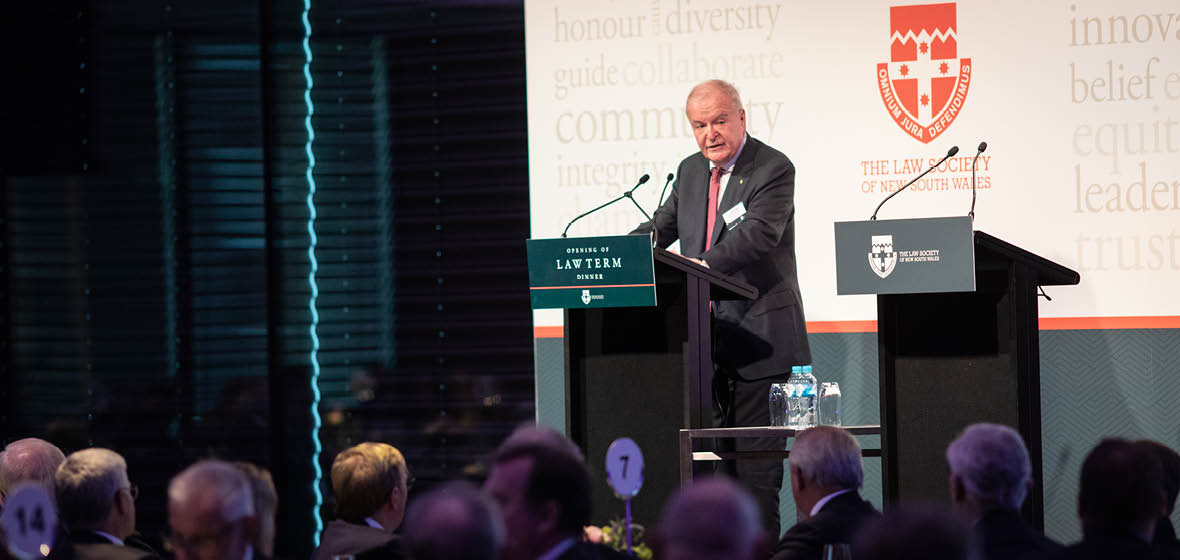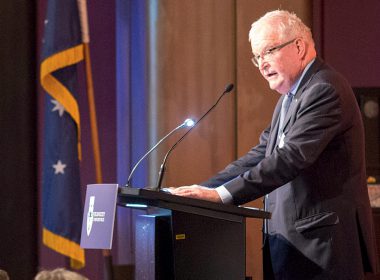The Chief Justice of the Supreme Court of NSW has revealed his court’s staff inboxes were inundated during the recent US Presidential election with misdirected criticisms of electoral fraud and former President Trump.
Speaking to members of the NSW legal profession at the Opening of Law Term Dinner in Sydney on Wednesday night, Chief Justice Tom Bathurst said the emails demonstrated a need to improve the public’s understanding of Australian courts and judicial powers.
“One email demands the court ‘does our job’ and address electoral fraud, while another describes that they are ‘baffled [that] the Supreme Court has not stepped in to list Trump and Pence out of office’. Another states the court is the ‘last hope’ for the United States,” Chief Justice Bathurst said.
“These emails illustrate the limited understanding that many members of the public have about the varying roles and powers of judges from court to court, and country to country.”
The Chief Justice commented that many members of the public “derive their information about judges and the courts indirectly, whether that is through the media, word of mouth or ever popular courtroom dramas”.
At worst, the Chief Justice said, this lack of understanding of courts and judges among the Australian public could lead to distrust of the judiciary.
Public trust in institutions is declining not only in Australia but in many other advanced industrialised countries.
– CHIEF JUSTICE TOM BATHURST
“Public trust in institutions is declining not only in Australia but in many other advanced industrialised countries,” he said.
“The public is regularly and deeply questioning the trust they place in institutions, and rightly so. If there was ever a period where we expected the public to blindly trust institutions, it is long gone.
“It is essential that the judiciary continually strives to build and rebuild trust by the public, and especially within communities that have traditionally had poor relations with the justice system.”
President of the Law Society of NSW Juliana Warner also spoke at the dinner, highlighting the importance of a trusted, independent legal profession – especially in the wake of recent international events.
“Our profession is a critical part of our democracy. Recent events in the United States underscore just how important a functioning legal system and an independent judiciary are for the health of democracy,” President Warner said.
President Warner praised lawyers in NSW for their lightning-quick adjustment to online and remote work during 2020, which enabled the nation’s legal system to carry on operating through the COVID-19 pandemic. She added to comments by the Chief Justice that online court hearings could improve accessibility and trust among members of the public.
“We went to work from kitchen tables and living room corners; on Teams and Zoom and via social media apps; in suit jackets and stretchy pants; with dogs barking in the background and cats on the keyboard and home-schooling kids on the floor,” she said.
“It was a powerful illustration of our commitment – regardless of the circumstances – to the principles that underwrite our peace and prosperity, including the rule of law and the checks and balances inherent in a civil society.”
President Warner said she felt honoured to be President of the peak body leading the legal profession in NSW and was excited about the year ahead. She concluded her speech by announcing her choice of the Law Society’s charity for the year as the Dementia Australia Research Foundation. It has been a cause close to her heart since she tragically lost her mother to early onset Alzheimer’s, and later worked on the Royal Commission into Aged Care.
“The inquiry revealed failures in the aged care sector but in particular it showed me that more than a decade after my mum had died, we are still a long way from understanding the causes of dementia. We are still a long way from effective treatments,” she said.
The President and Law Society will announce upcoming fundraising initiatives for the charity in coming weeks.


